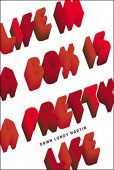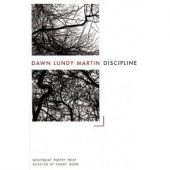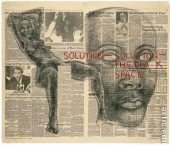On Writing a Futurespeak: An Interview with Dawn Lundy Martin
by Abigail Meinen / September 27, 2017 / No comments

Image via the author.
Dawn Lundy Martin is interested in the ways that language is a time traveller- how it lives in the past and present, and how it can be used to create a future to live within.
She is the author of three award winning books of poetry; A Gathering of Matter/A Matter of Gathering (2007) earned her the Cave Canem Prize, DISCIPLINE (2011) was a Nightboat Books Poetry Prize recipient and finalist for the LA Times Book Prize, and Life in a Box is a Pretty Life (2014) won the Lambda Literary Award for Lesbian Poetry.
She currently teaches creative writing at the University of Pittsburgh. In 2016, she co-founded the Center for African American Poetry and Poetics, where she currently serves as co-director.
Martin was faculty for the 2017 Cave Canem Writer’s Retreat, which culminated in a reading at City of Asylum, Pittsburgh. In preparation for her forthcoming collection, Good Stock, Strange Blood (August, 2017), she spoke with Sampsonia Way about the voices in her writing, the navigation of identity, and the material and imaginative work she believes that language can do.
There is a very cold, bureaucratic, detached voice that shows up over and over again in Life in A Box Is A Pretty Life. Can you talk a bit about that voice – how you use it, what it means to you, and where it comes from?
In Life In A Box Is A Pretty Life (Nightboat, 2014), there is the imposition of an authorial, official voice that’s claiming one thing and often meaning or doing another. That claim often comes out of a desperation to put messages in the world- messages that shape the world in favor of some kind of oppression or annihilation or sadism or what have you. And it just pops up- it doesn’t emerge in any kind of linear way. One of the reasons I had that voice spread through the book is because I’m thinking about the way in which those messages are really almost illegible, unreadable. I think in this particular political moment, they’re more readable on the surface of discourse. But for the most part, they kind of intertwine within the ways we think about reality, and then they help create reality, even though they’re fake messages. So I wanted to have that breathing up through the book, around all of these other utterances, and all these other people, beings, and figures, who are speaking or attempting in some way to assert themselves.

Image via Nightboat Books.
How much of the work do you feel is grounded in the present, and how much is grounded in the past? How do you see the past and present coming together in your writing?
One of the ways that time happens in the book is in the middle section, which is a kind of erasure from scientific racist texts of the 19th century. The idea is to place that language in the future and in the now, and see what it does. How do we understand that language now? I’m attempting to take the pieces of the language that feel most resonant to me.
Time is collapsed, in a way; it’s really about the relationality between the past and the present. The real desire for that book was to move into an imagined future space, but then it just didn’t happen in that book. The new book, which comes out in August, also had that same desire, but I’m not sure that it happens there either. My biggest, most optimistic thought about the way language works is that you can write language that actually makes material, or shapes reality. If we’re able to write language in a way that is aware of the past, but not necessarily tethered to it, that would be the most amazing kind of futurespeak.
My biggest, most optimistic thought about the way language works is that you can write language that actually makes material, or shapes reality.
There’s a lot of conversation, in this book and in DISCIPLINE (Nightboat, 2011) about “the I.” Throughout that exploration of, “What is the I?” are there certain things that ground you in that voice, even amongst the tumultuous questioning of what that “I” even is?
I’m really attempting to push myself to be able to write a stable speaking “I” that is a black subjectivity without it feeling in some ways overly constructed. I think that one of my most core beliefs about what it means to be is that if you experience trauma- and I think that in some ways, the black experience is a kind of trauma – that it’s difficult to be cohesive. That impossibility of being cohesive makes it hard for me to re-write that “I” over and over and over again. It’s a very slippery thing. If I write it in one moment, it slips away in the next and it becomes something else. Sometimes “I” can become “you,” sometimes it can become “she,” sometimes it can become, “it,” even. I’m wondering if there’s language that I can write around it, that I can reconfigure, so that I can use it more persistently, without it feeling constructed, or slightly fake, like an artifice that I don’t necessarily want in a poem.

And now, are you working on a memoir?
I haven’t been able to write since the semester ended, but if I were writing… [laughs]. I’m trying to figure it out. What I have been doing is trying to write these essays that were going to be a part of this book, and then I was trying to publish the essays in mainstream publications: magazines. But what I found out, actually, is that the big famous magazines have certain conventions for editing – and your work starts to look less like your work. At least, that was my experience. So, I have to figure out a way of working out this memoir. I’m learning how to write autobiographical prose. It’s not like I’ve done it over the course of 250 or 300 pages; I’m really trying to teach myself. And I’m also trying to figure out what that kind of writing means for me. So I’m in a really exciting infancy, really, when it comes to this project.
If we’re able to write language in a way that is aware of the past, but not necessarily tethered to it, that would be the most amazing kind of futurespeak.
How are you trying to approach storytelling in the work that you’re doing?
In every single book of poems, to me, there are really, explicit autobiographical moments and gestures, specially in A Gathering of Matter / A Matter of Gathering (2007), my first book. Almost all of it comes out of trying to speak to personal sexual violence, actually. In trying to find a language for it, but it being a near impossibility, language is always breaking away or falling apart, or it becomes myth, or something like that. That was the book that I felt most compelled to write, in fact, because it was like therapy. It was life saving to write that work. So, how do I approach narrative? The way that I think happens to be multiple. I approach narrative both in a kind of conventional storytelling way, but I would kind of have to also do something else in addition to that, in order to legitimately tell the story that I think I want to tell.
Who are the people and voices that you’ve read or interacted with that you feel really connected to, that allowed you to tell some of these stories?

From Adrian Piper’s “Vanilla Nightmares”
I always feel compelled to reference my mentor, Myung Mi Kim, who is really important to me, and helped me to figure out the best ways for me to speak the unspeakable things I was trying to speak. Through her inarticulation, or un-articulation, she helped me think about being displaced, a perennial refugee- someone who’s always in between spaces because the place she is from no longer exists. In her work trying to negotiate that, she really helped me to figure out a possibility for experiences and ways of being that really have no language. And if they have no language, and you’re using language, then you’re in a real wicked bind. [laughs] You gotta figure that out. And really, I also love a lot of visual artists. I love the conceptual artist Adrian Piper. I like work that has a lot of layers to it. For some reason, it’s just what I’m attracted to- things that you have to figure out, or that have multiple layers in terms of the way that they’re trying to make media. It’s not so present that you just crack it immediately.




